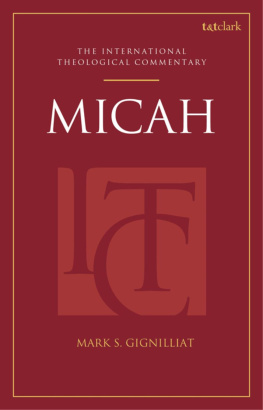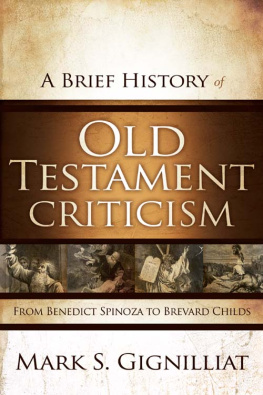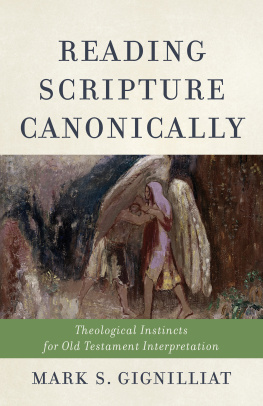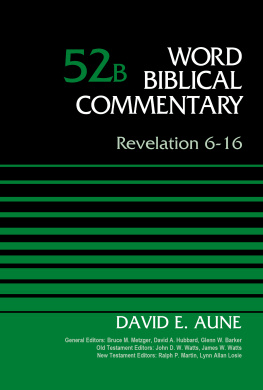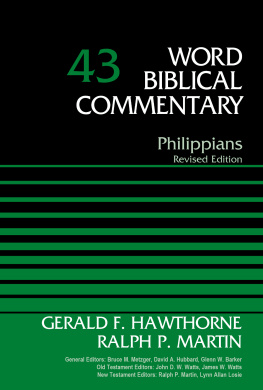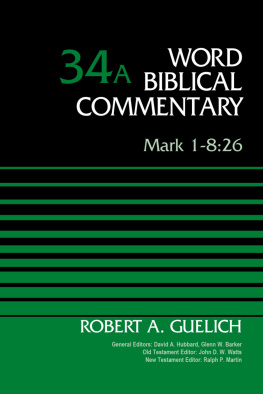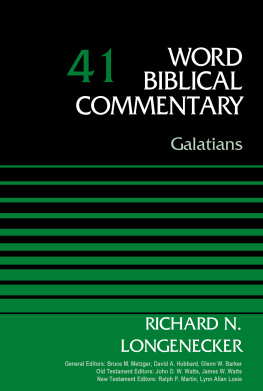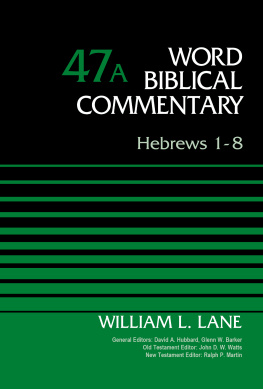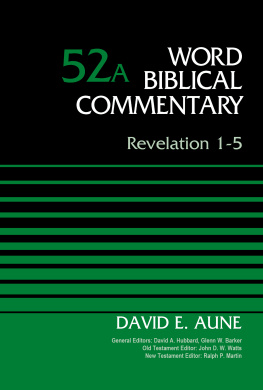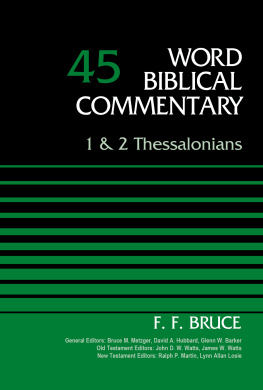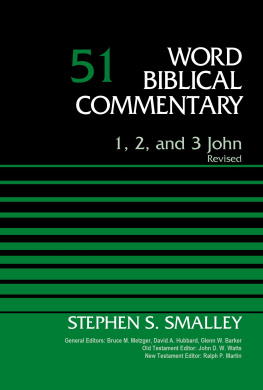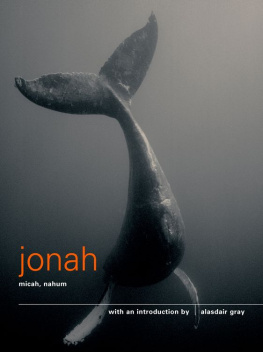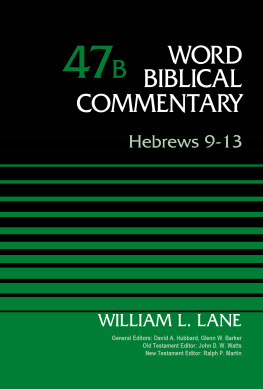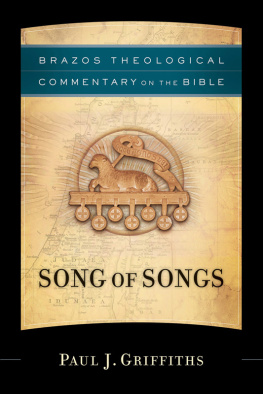The International Theological
Commentary on the Holy Scripture
of the Old and New Testaments
General Editors
Michael Allen
of Reformed Theological Seminary, USA
and
Scott R. Swain
of Reformed Theological Seminary, USA
Consulting Editors
Mark Gignilliat
of Beeson Divinity School, USA
Matthew Levering
of the University of St. Mary of the Lake, USA
C. Kavin Rowe
of Duke Divinity School, USA
Daniel J. Treier
of Wheaton College, USA
Micah
An International Theological
Commentary
Mark S. Gignilliat

For Frank Limehouse
Pastor, Friend, and Lover of the Gospel
The T&T Clark International Theological Commentary Series aims to offer interpretation of the Bible that addresses its theological subject matter, gleaning from the best of the classical and the modern commentary traditions and showing the doctrinal development of scriptural truths. In so doing, it seeks to reconnect to the ecclesial tradition of biblical commentary as an effort in ressourcement, though not slavish repetition. Alert to tendencies toward atomism, historicism, and skepticism, the series seeks to offer a corrective to the widespread pathologies of academic study of the Bible in the modern era.
In contrast to modern study of the Bible as a collection of witnesses (fragmented and diverse) to ancient religious beliefs and practices, this series reflects upon Holy Scripture as a common witness from and of the triune God of the gospel. These interpretations will give priority to analysis of the scriptural text as such, reading any given passage not only in its most immediate context but also according to its canonical location, in light of what has historically been termed the analogia scripturae. In so doing, however, the series does not mandate any uniform approach to modern critical methods or to the appropriation of classical reading practices; the manner in which canonical reading occurs will follow the textual form and subject matter of the text rather than dictate them.
Whereas much modern biblical criticism has operated on the presumption that the doctrinal resources of the church are a hindrance to the exegetical and historical task, commentaries in this series will demonstrate a posture of dependence upon the creedal and confessional heritage of the church. As Zacharius Ursinus noted centuries ago, the catechetical and doctrinal resources of the church are meant to flow from and lead back unto a cogent reading of the biblical canon. In so doing, the reception history of the text will be viewed as a help and not merely an obstacle to understanding portions of Holy Scripture. Without mandating a particular confessional position (whether Eastern or Western, Roman or Protestant), the volumes will be marked by a creedal and confessional alertness.
Finally, commentary serves to illumine the text to readers and, thus, does well to attend not only to the original horizon of the text but also to its target audience(s). Unfortunately, much biblical interpretation in the modern academy (from both its more liberal and conservative wings) operates as if a sharp divide should be drawn between the source horizon and the receptive horizon. This series, however, gestures toward contextual concerns regarding how the biblical literature impinges upon, comes into confrontation with, or aligns with contemporary questions. While the series does not do the work of homiletics, the commentator ought to exposit with an eye to that end and an ear to those concerns.
In seeking to honor these canonical, creedal, and contextual commitments, then, the T&T Clark International Theological Commentary Series will include sequential commentary on the totality of scriptural books, though the format of volumes will be shaped by the specific demands of the various biblical texts being expounded. Commentators will provide English translations or make use of widely known contemporary translations of varying sorts, but their exposition will be based ultimately upon the original language(s). Commentators will be selected for their capabilities as both exegetical and dogmatic theologians, demonstrated in linguistic and literary facility, creedal and confessional clarity, and an ability to relate the two analytic exercises of dogmatic reasoning and exegetical reasoning. Through its principles, format, and selective criteria for commentators, the series intends to further sketch and, in so doing, show the significance of a theological reading of Holy Scripture in the modern era.
Michael Allen and Scott Swain
This project took longer than I anticipated. I am also aware it could use more time. Like ships, commentaries need to be abandoned at times, especially given the richness of Scriptures material form and the infinite reach of its subject matter. In part, the challenge of this commentary was its seemingly limitless possibilities. The plane struggled to get off the runway, so to speak. I have little doubt this commentary may frustrate readers who inhabit the social space of a particular theological discipline. Bible scholars may take issue with lines of inquiry unexplored or left attenuated, with the expected interpretive hurdle of transgressing Micahs historical particularity. Theologians may wonder why a particular line of thought or figural extension received short shrift. I feel the force of these potential receptions as I abandon ship.
The form of the commentary follows a pattern established by Karl Barths Church Dogmatics, though in reverse. The larger print follows the texts verbal character and literary logic, in light of Micahs theological subject matter. The small print explores figural or theological extensions of the text where such are deemed organic or in accord with the texts literal sense. The danger of this format is the suggestion that the small print is where theological reflection occurs, somewhat distanced by material form from the verbal and literary logic of Micahs prophetic text. Now, lets do some theology post facto. Such is not the case. I understand the small and large print as inhabiting the same space provided by the texts verbal character and theological subject matter. I retain the distinction in font as an aid to the reading process, a tool to help the reader retain his or her orientation. At the same time, readers will discover the small and larger print bleeding into each other and not living up to a strict division or pattern.
I owe a debt of gratitude to Beeson Divinity School and Samford University for a sabbatical leave during the 20112012 academic year. I was awarded a faculty development grant from Samford that significantly aided my sabbatical travels. I remain grateful for this opportunity as much of the groundwork for this project took place during that time. I also extend my thanks to Professor Hermann Spieckermann of the University of Gttingen who hosted me during a six-month stay in Gttingen. For those who know Professor Spieckermann, it goes without saying that a kinder and more gracious host cannot be found. I also thank Nathan MacDonald and his family who also hosted us during our time in Gttingen. Nathans productive research habits are exemplary, and I benefited much from my time with him.
My Doktorvater Christopher Seitz stands out as a consistent dialogue partner both in the real and in my head. His intellectual energies and capabilities loom large, and I am honored to stand in his shadow. My thanks go to Don Collett as well. Dr. Collett is a friend and thinker of the highest order. I owe much to him and his intellectual gifts. Former student and priest, David Tew read through the manuscript and offered substantial help along the way. My colleagues at Beeson Divinity School continue as fruitful and able interlocutors. I thank especially Dr. Carl Beckwith, though many others should be named. I would be remiss if I failed to mention my students at Beeson Divinity School and the parishioners of the Cathedral Church of the Advent. These friends in both places afforded me contexts for teaching and thinking through Micah. Ive grown accustomed and grateful for the fruitful interaction of academy and church.
Next page
